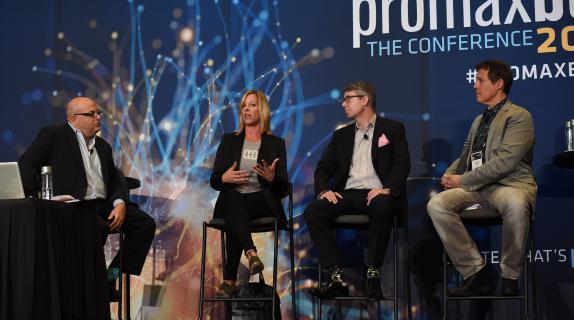You already know how to cut a great sizzle reel or grab viewers’ attention with a 30-second spot. You’ve translated that knowledge to digital and are creating campaigns that reach viewers both on their TV screens and their mobile devices. But now you want to try your hand at telling stories longer than 30 seconds. How do you make the transition?
A panel of creative executives who’ve done just that let the crowd into a few secrets during the “You Promote It. Why Not Create It? Leaping from Promos to Long Form” panel at PromaxBDA: The Conference 2015 on Wednesday at the J.W. Marriott LA Live.
“You already have a huge advantage, you know how to sell,” said Sharon Levy, Spike TV’s executive VP of original series. “That’s 90% of the hurdle in getting viewers to watch something.”
“Great marketing equals great storytelling,” said panel moderator Chris Sloan, chief creative officer of 2C Media, which produces everything from marketing campaigns to sales presentations to promo spots to reality TV shows.
One of the reasons that prolific promo producer Studio City began to produce series was merely because of the logic of the leap.
“We’ve all done sizzles for shows that don’t exist yet,” joked Studio City’s Stu Weiss. “Time and time again a show was greenlit because of our sizzle reel. How many times do you want to see that happen before you realize, ‘hey, we can come up with a terrible idea and do a sizzle for it ourselves?‘”
Turned out that Studio City had a good idea for syndicated entertainment news magazine Dish Nation, which it produces for the Fox Television Stations. Dish Nation features radio deejays from several markets across the country talking and joking about the entertainment news of the day. From there, Studio City began to more seriously explore this area and now is in development on more than a dozen shows.
That brings Weiss to his next piece of advice for aspiring unscripted series producers: get a good agent.
“I resisted the whole idea of having an agent. Why should we do all the work … and then they take 10% off the top? The first show was easy to get on the air. But now we have multiple shows we are pitching and we really needed an agent.”
Even with an agent, however, it’s important to get the pitch right. If you are going to present a show idea to a network, you can’t show up with a pitch that includes a lot of ifs, ands or buts, said Collin Reno, partner and co-head of WME’s unscripted television department.
“When you are thinking through the idea, whether it’s a docuseries or a game show, have all of those questions answered. If you don’t have it all covered, don’t pitch it,” said Reno.
In fact, it’s best if you have your deals done before you even enter the pitch meeting. For example, when Miami-based 2C was doing a show that took place at Miami International Airport, it had all of the necessary agreements signed off on before taking it to any network.
“It costs money to hire lawyers and negotiate deals,” said Levy. “When people tell me they’ve secured access, I always say ‘great, send me the paper.’ And we never see it.
“If you have a personal relationship with someone in a really unique world and you don’t have the ability to negotiate out an access deal, partner with a production company.”
Locking down the access before you pitch your idea also helps assure that you will stay in the mix should the show go into production, said Reno.
“How do you stack the deck in your favor so that the network wants to produce with you?” said Reno. “How do you make yourself indispensable? If you’ve already secured proprietary access to the site, you can’t get pushed out.”
That said, don’t expect to be running the show, especially if it’s your first project, unless you are Weiss and your executive producer of hire goes out sick three days before launch and never returns.
“I hired an EP who had done a nightly news show and three days away from us launching the show, during rehearsal, she was carted away on a gurney by LAFD and that was the last I ever saw of her. In three days, I had to learn how to be EP. I had never done an entertainment news show. It was truly baptism by fire,” he said.
That said, it’s unlikely that you will find yourself executive producing your project if you’ve never done it before, but do take the opportunity to get some different experience on your resume.
“The expectation that you are going to be running the show is crazy,” said Levy. ”That’s not going to happen.
“But do ask to be a part of it. Whether it’s a supervising producer or whatever, getting that hands-on experience, even though it might actually be a step back from where you are in your marketing career, is a step forward in your long-form producing career. You may make less money. Is that okay for you in the short term for a bigger potential payout in the long term?”
Image courtesy of Image Group LA.
Tags:












































__twocolumncontent.jpg)











